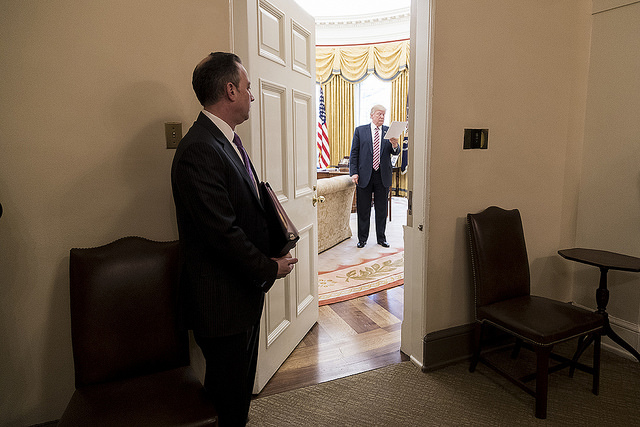More on Rule of Law in the Trump Administration and the Role of Congress
The President, through his Office of Management and Budget (OMB), is fighting again with the Office of Government Ethics (OGE). The dispute is over OGE access to granted ethics waivers that have permitted Administration officials to work on matters on which they lobbied prior to entering the government.

Published by The Lawfare Institute
in Cooperation With

The President, through his Office of Management and Budget (OMB), is fighting again with the Office of Government Ethics (OGE). The dispute is over OGE access to granted ethics waivers that have permitted Administration officials to work on matters on which they lobbied prior to entering the government. OMB is questioning OGE’s authority about which, OGE insists, there can be no question, and the ethics office is taking its case to Congress. We are back again to the question of whether the House, the Senate, or both, will look beyond the particulars of Russia probe into the basic question of how the Administration functions on rule of law issues.
Congress has a specific constitutional role under the Emoluments Clause in reviewing the structure of the President’s and his relative-advisers’ business interests. It can consent to the President’s receipt of payments or gifts from foreign government sources. To give or withhold consent, it must judge whether there has been any such receipt. There are arguments both ways, and a pending lawsuit tests the Clause’s application in the case of the Trump business interests. Moreover, there is the question of the role of Justice Department in the defense of the President’s position on the Emoluments issue. Is it appropriate for the Department to lead that defense—a defense that implicates the President and his family’s business interests—or should that task fall to President Trump’s own lawyers?
Congress has so far stayed away from active involvement with these issues. It faces the same choice—act, or let things go—in the fight between OGE and OMB.
Under a “broken window” policing theory, Congress should not hone in only on the main show, the large issues around any connection or “collusion” with Russia. The President seems to be struggling with fundamentals of setting up and guiding a government that operates more or less reliably within reasonably well-recognized ethical and legal lines. Or it could be that he is unable to break old habits: He is wedded to the uses of law and lawyers that he believes served him well in his business. In his long career in the private sector, he pictured the law as a navigable complication that lawyers would find a way around, or as a tactical weapon to be deployed in the threat or filing of lawsuits. With election to the presidency, President Trump’s relationship to law and the legal process has changed, but there is reason to doubt that he has absorbed what his new station in life requires of him.
President Trump’s remarks to the Russian Foreign Minister and Ambassador about Mr. Comey and the Russian probe may be seen in the light of his failure (or unwillingness) to adjust to his new responsibilities. In explaining that he had ridded himself of the “pressure” of the investigation. President Trump may have meant only that, with less of a furor over the Russian connection, he is freer to focus on the policy changes he would like to pursue. Politics—what the President has called the “made-up” story about Russia—would not interfere with that policy. Or Trump may have been attempting to impress these particular guests with his power and savvy in dealing with unwanted obstacles. He is the Chief Executive who will tolerate no nonsense: the mogul who can get things done.
It is this same assertion of will from the executive suite that led the President, as reported, to expect and demand “loyalty” from the former FBI Director. In the last day, he also called on the chiefs of intelligence agencies to publicly exonerate him of wrongdoing in the Russia probe, and to intercede with the FBI to stop its investigation. Mr. Trump seems to view these public officials as the equivalent of division heads within the company he runs who should be answering to the boss.
In The National Review, Greg Weiner calls on conservatives to stop making excuses for the President’s behavior or hoping to ride it out long enough for the Congress get basic conservative business done. The President displays, he writes, a fundamentally “un-conservative” disposition, one wholly deficient in the “intellectual humility, deference to custom [and] acceptance of time-honored norms” that protect against abuse of power. Weiner might also have mentioned a pronounced respect for law and legal process that the Administration, which cannot be run like the Trump Organization, must be able to demonstrate.
It is not only in the big things, the headline concerns with Russia, that this Administration’s rule of law posture will be addressed. The smaller things matter, too: all the various windows with cracks showing, or now breaking. Congress will—or should—have to decide what to do about them.





